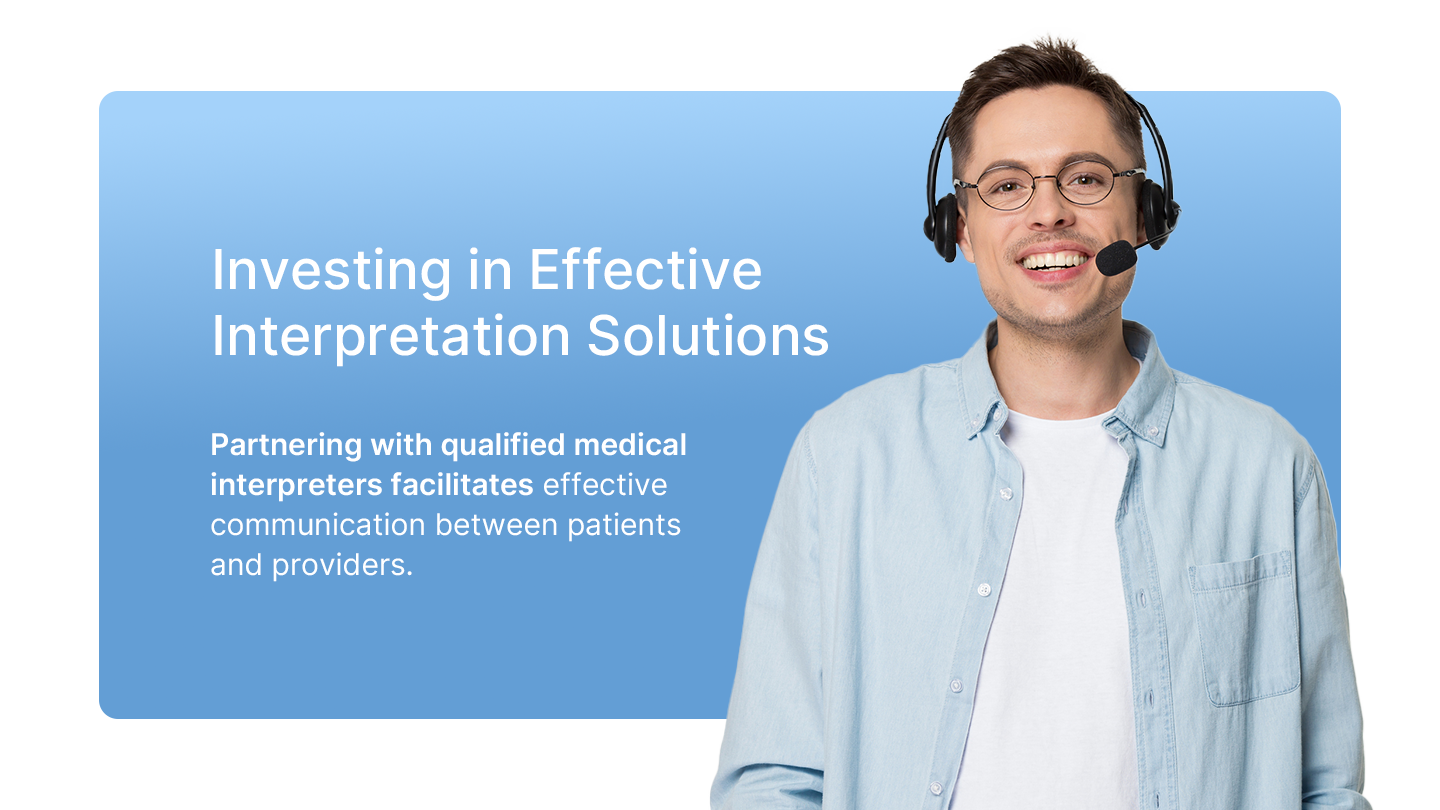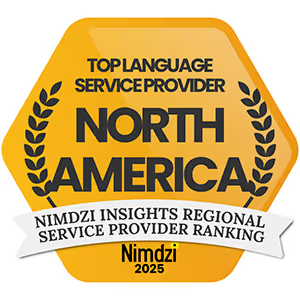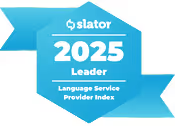Did you know that more than 20% of homes in the U.S. speak languages other than English, and 8% of individuals five years or older have limited English proficiency?
Limited English proficient (LEP) individuals are “[Those] who do not speak English as their primary language and who have a limited ability to read, speak, write, or understand English [...]. These individuals may be entitled to language assistance with respect to a particular type or service, benefit, or encounter.”
LEP individuals often express dissatisfaction with their medical care, feeling unheard, ignored, or dismissed. Medical staff may also struggle to connect with or understand them. This disconnect shows that cultural sensitivity and awareness is something medical facilities need to keep in mind in order to provide top-notch care.
Cultural competence – or cultural awareness and sensitivity – describes healthcare providers' ability to deliver care that is respectful and responsive to diverse patients' health beliefs, practices, cultures, and linguistic needs. Lack of cultural competence in healthcare can lead to poor health outcomes, unhappy patients, and widened health disparities.
Explore why cultural competence matters, what makes it hard to achieve, and how to improve cultural competence in healthcare.
Importance of Cultural Competence in Healthcare
Culture shapes how patients view their health, illnesses, and healthcare. Patients from different cultures may describe symptoms differently, have different beliefs about what causes illnesses, and prefer different treatments.
Culturally competent healthcare is essential for numerous reasons, including:
- Allowing providers to individualize care plans to each patient's unique needs and preferences.
- Enhancing patient satisfaction and trust in the healthcare system.
- Showing respect for patient autonomy and cultural identity, increasing patient engagement.
- Facilitating accurate diagnosis by helping providers discern between culturally normative behaviors and potential signs of illness.
- Improving patient-provider communication.
- Reducing health differences among culturally diverse populations.
- Improving patient compliance, leading to better health outcomes.
Barriers to Cultural Competence in Healthcare
While the benefits of culturally competent care are clear, several complex barriers restrict its consistent delivery.
Linguistic Differences
Language differences between patients and providers are a major obstacle to culturally thoughtful care. When patients and healthcare providers don’t share a common language, it becomes difficult to discuss and understand concerns, diagnoses, and treatment options. Subtle meanings and cultural connotations can be hard to decipher without a skilled medical interpreter, leading to misunderstandings and ultimately, compromised care.
Nonverbal communication differences can also lead to misunderstandings. Eye contact, physical touch, and personal space boundary norms vary across cultures. Healthcare providers may accidentally offend or alienate patients by not adapting to these differences.
Cultural Beliefs and Stereotyping
Healthcare providers may not always be aware of or understand their patients' cultural beliefs and practices. As a result, the provider may use approaches to care that conflict with the patient's values. Providers could also ignore cultural differences and use a one-size-fits-all approach to care. Such mismatches can erode patient trust and compromise the quality of care.
Unconscious bias and cultural stereotyping can also wrongly influence clinical decision-making. Providers may make assumptions about patients' health beliefs, pain tolerance, ability to understand certain information, or treatment preferences based on their cultural identity. These biases can lead to different treatment recommendations, underdiagnosis of serious conditions, and patient disengagement.
Lack of Training
Many healthcare providers receive limited formal training on how to deliver culturally competent care. Cultural competency in healthcare is often treated as an optional extra rather than a core clinical skill. Without a strong foundation in cultural humility, cross-cultural communication, and bias reduction, providers may feel unprepared to handle the complexities of culturally diverse patient interactions.
Even when cultural competency training is offered, it is often a one-time event rather than an ongoing learning process.
How to Improve Cultural Competence in Healthcare
Improving cultural competence in healthcare requires a multipronged approach that addresses individual, interpersonal, and organizational factors. Here are some key strategies.
Investing in Effective Interpretation Solutions

Language barriers are a significant obstacle to culturally competent care. Having a language access program is key. This program should include language-concordant care and interpreting and translation services.
Partnering with qualified medical interpreters facilitates effective communication between patients and providers. Interpreters should be fluent in and sensitive to cultural nuances in order to provide contextualized interpretation or ask for clarifications if communication breaks down due to cultural misunderstandings.
Healthcare facilities should also invest in translated patient materials, such as consent forms, discharge instructions, and health education resources. These materials should be culturally and linguistically appropriate, using plain language and visuals to enhance understanding.
Cultural Sensitivity Training for Healthcare Staff
Ongoing cultural competency training equips healthcare staff with the knowledge, skills, and attitudes to deliver culturally-responsive care. Training programs should cover topics such as the following:
- Cultural self-awareness
- Cross-cultural communication
- Implicit bias
- Culturally specific health beliefs and practices
Training should be tailored to the specific needs of different healthcare roles, from front-desk staff to clinicians and administrators. Cultural awareness training should also be integrated into ongoing professional development and new staff orientation to reinforce learning and maintain regulatory compliance.
Policy and Procedure Adjustments
Integrating cultural competence into organizational policies and procedures creates systemic change that ensures equitable and quality care for all. Healthcare facilities should comprehensively review their policies to identify cultural bias issues. After review, they must address all cultural biases or barriers to equitable care.
Policies should also prioritize recruiting and retaining a diverse workforce. Healthcare workers should reflect the cultural and linguistic makeup of the patient population. Diversity in leadership positions especially drives cultural competency initiatives and ensures accountability.
Community Engagement and Feedback
Building cultural competence requires ongoing engagement with the communities served by healthcare facilities. Community outreach initiatives, such as health fairs and educational events, can help build trust and understanding between healthcare providers and patient populations.
Establishing patient and family advisory councils can provide insight into the cultural needs and preferences of specific communities. These councils can offer feedback on healthcare services, identify areas for improvement, and collaborate on culturally responsive care initiatives. Partnering with community-based organizations and cultural leaders is also crucial. The partnership can help healthcare facilities better understand and address the social determinants of health that impact diverse patient populations.
Why Trust Martti?
Martti is an expert in providing culturally sensitive services in healthcare. We have over two decades of experience providing language access solutions to healthcare facilities. Our highly trained medical interpreters ensure culturally sensitive care by delivering exceptional medical interpretation for LEP, Deaf, and hard of hearing patients.
With our remote innovative technology solutions, we help healthcare organizations improve patient satisfaction, reduce readmission rates, and enhance health outcomes. Martti's commitment to equitable care through language access is reflected in our rigorous interpreter training and certification programs. Our expertise in language access and healthcare communication gives us remarkable insight into how to improve cultural competence in healthcare.
Deliver Culturally Competent Care with Martti
Cultural competence ensures high-quality, equitable healthcare in a global society. Bridging language gaps is an essential part of providing culturally thoughtful care to all patient populations.
At Martti, we are proud to support healthcare facilities in their cultural competency efforts through our state-of-the-art video remote interpreting platform and highly trained medical interpreters. Our technology seamlessly integrates with existing workflows, enabling patients and providers to access interpreters on-demand, 24/7, and in over 250 languages, including American Sign Language.
Book a demo today to experience the Martti difference firsthand or contact us to learn more about how our language services can help you improve cultural competence.

Linked sources:
- https://share.america.gov/united-states-is-rich-in-languages/#:~:text=In%20other%20words%2C%20while%20the,speak%20languages%20other%20than%20English.
- https://www.kff.org/racial-equity-and-health-policy/issue-brief/overview-of-health-coverage-and-care-for-individuals-with-limited-english-proficiency/
- https://pmc.ncbi.nlm.nih.gov/articles/PMC6571328/
- https://www.martti.io/interpreters
- https://www.martti.io/case-studies
- https://www.ncbi.nlm.nih.gov/books/NBK493216/
- https://healthadministrationdegree.usc.edu/blog/stereotypesin-healthcare-can-make-patients-avoid-care
- https://www.martti.io/integrations
- https://www.martti.io/demo
- https://www.martti.io/contact










